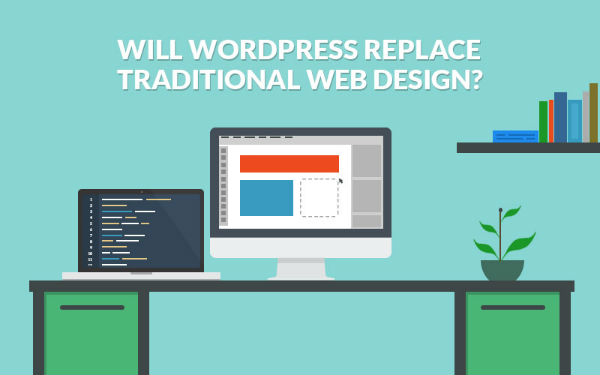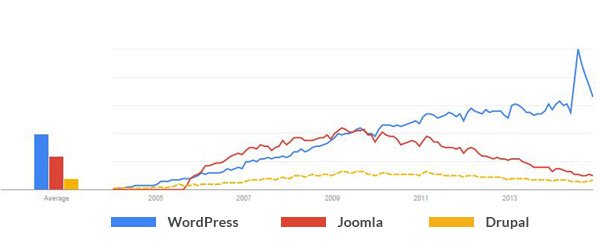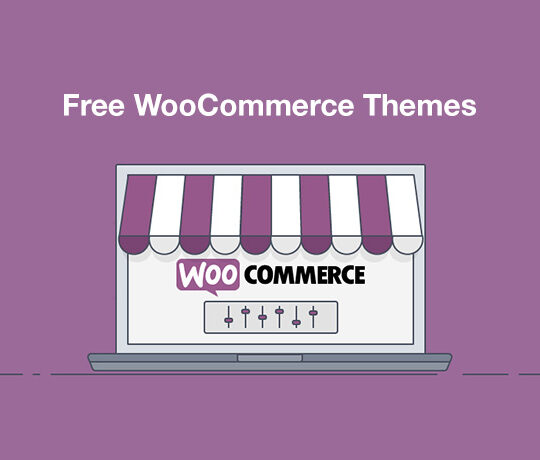
Today everyone wants/needs to have a website. From the housewives who would like to spread their amazing recipes on their personal blogs, to the photographers with the aim of showcasing their work in their online gallery, and the enterprises who simply cannot compete with their rivals and enlarge their clientele without an online presence. How can these businesses of different size and budget get along and find the right way to having their website done? Does WordPress meet the wide range of requirements?
Changing Trend
The reason I picked this topic is that I’ve been contemplating the phenomenon of the disappearance of hand-coding with amazement. Few years back I worked at a web design agency where we constantly worked on creating websites for clients from scratch. By traditional design, I mean the time consuming hand-coding, building websites from the ground up. Now, this demand seems to fade.
In the recent years, clients have obvious requirements: building their websites based on a CMS (mainly WordPress, we’ll investigate the reasons later).
In the following sections I would like to explain the benefits of CMS’s, the reasons for WordPress being the most popular one, and how it is connected to the descending trend line of traditional web design.

The Domination of CMS’s
A Content Management System (CMS) is the key today to have an organized website that rests on solid foundations. CMS’s generally aim to avoid the necessity for hand-coding, nevertheless support coding in case of custom elements or features have to be added to a website’s functionality. CMS’s both facilitate the job of web designers and developers, and help site owners organize and edit their content, as well as provide version-control access to their data and store their files.
CMS’s just like WordPress made it possible for plenty of people to appear online with an own website, by providing a friendly solution at a reasonable price.
The biggest and most popular content management systems of the recent years have been Drupal, Joomla and WordPress. These three are more similar than different considering the main functions a they have to provide. Before any developer kills me for my previous sentence, let’s pinpoint, there are tons of differences of course, but I won’t go into details here, and try to focus on WordPress hereafter, as I have experience in that field.
The Growing WordPress Empire
WordPress proves itself to be far more popular than any other solutions. There may be several reasons for becoming the number one in the recent 3 years. One of these is that WordPress is already much more than a blogging tool it was originally, it is now powering more than 23% of the websites and the number is increasing month by month.
The user base voting for WordPress is growing steadily, as WordPress itself does. They hear about it, read about it, and they are aware of the most important selling point of the platform: it is usable. Thus website owners will be able to update and manage their website later and won’t have to pay for someone else to do it.
WordPress goes far beyond usability and scalability. Its growing community and the hard work of its developers’ army make it possible for everyone to set up a website in no minute, then customize it with the help of the many thousands of tutorials available on the web.
WordPress with its extensions is a goldmine both for a beginner and for a developer. There are more than 30,000 plugins and around 3,000 themes available free of charge in the official WordPress repository, plus the paid ones, which (despite the fact that WordPress may still not be the best choice for a site that needs heavy customization) can help anyone edit a website effortlessly, as well as change the look and the functionality of a site, or extend its features, just like a magic wand.
Why WordPress is Remarkable
There is a long list of special features that WordPress provides. Let’s see why it became the most popular content management system.
- Setting up a website “armed” with dozens of features has never been easy. Thanks to WordPress being an open source CMS, anyone can download and use it free of charge, furthermore, themes and plugins are available for free or at a reasonable price.
- Social Media Friendly. There are many tools for integrating your site or blog posts automatically with social media, which helps broadening your community circle and gaining new readers and customers.
- SEO Friendly. With its friendly permalink settings, consistent code and powerful SEO plugins this CMS is probably the most SEO friendly of all currently.
- User Friendly. The amazing tools and themes aim to provide a “puzzle-effect” for users. Who doesn’t love puzzles, right? Using drag and drop interface and visual composer makes customizing a website a real fun, especially when these two features are combined, like in Startup WordPress Theme released recently by Designmodo.
- With the plugin system you can set up almost any functionalities in just a few clicks.
The Costs of Hiring a Designer or a Developer Today
How does this full-scale solution affect traditional design/development work and the whole ecosystem built around it? Let’s see the average prices of creating a WordPress based website traditionally by an agency.
Prices vary a lot thanks to the diverse set and needs of clients. Every business has its unique needs, and it’s not a pushover to match the budget available with the high expectations of the client.
There are several types of agencies and freelancers providing web design and development services. Some of them guarantee overall assistance including creating the website, SEO and marketing services, fixing bugs and maintenance. Others are specialized in one field only. There is a huge difference in prices though, building up a website can cost from $300 to more than $100,000.
The reasons for the gigantic diversity in prices are as follows:
- Depending on the characteristics of a project, clients can be charged hourly or by the project. Hourly rate is a lot more traceable, but a sum is usually a more fair offer.
- Freelancers are generally cheaper, as in many cases they do web design part time and charge the client by an hourly rate (an average hourly rate of a freelancer starts at $25, while a small market agency charges from $50/hour, and a large agency does the same from $75 hourly).
- Prices also depend on the location of the agency. In some leading countries like the US, Australia and the UK clients can assume higher fees.
- As the price is calculated based on the time spent on working on the project, agencies usually go with a higher fee: they have their separate employees for each task from sales to design, development and maintenance, so fees are multipliable.
- If a WordPress theme can be used as a base of the website, the grand total will be a way more affordable than in case of building everything from scratch.
Let’s suppose you would like a simple website for your plumbing business, with 3-4 sub pages, with no development work needed, and a custom design. It takes approximately 20 working hours to complete this project, and depending on who you choose (freelancer, small agency) to do the work for you, the project can be done for $500-1000 with a quick turnaround time.
Generally speaking, a website built on WordPress is likely to cost much less than the one built from scratch. Also, once you vote for WordPress, you will still have two options to choose from: doing it with the help of an expert or by yourself.
So Where are We Heading?
While the trend shows that hiring expert web designers and developers is on the wane, there will always be a need for investment in hand-coding. As the range of options that WordPress offers is broadening (and the CMS continues to be dominant on the market), gone are the days when everyone has to pay a fortune for a website. However, there are some businesses who still will. For behemoth enterprises with custom requirements and the need of website maintenance, a webmaster is priceless, and it’s worth paying even hundred thousands of dollars for them.
Have you experienced any changes in the trend as a designer/developer? In which cases do you think there’s a special need for hiring an expert? Let me know your thoughts in the comment section below!






 6 Must-Follow SEO Tips For Every WordPress Photoblogger
6 Must-Follow SEO Tips For Every WordPress Photoblogger  All Websites Should Feature Videos and Here’s Why
All Websites Should Feature Videos and Here’s Why  Top 16 Free WooCommerce Themes
Top 16 Free WooCommerce Themes  Top 25 Free WordPress themes from 2020
Top 25 Free WordPress themes from 2020  Teamstack: Team-as-a-Service Provider with Convenient and Secure Solutions
Teamstack: Team-as-a-Service Provider with Convenient and Secure Solutions
Tony Lancaster Nov 25, 2014, 6:40 pm
My experience echoes yours. I have moved from hand building sites to only using WordPress. Given the frameworks available now and the extremely flexible themes (think Elegant Themes Divi or Rockythemes) I just don’t need to invest the energy I used to in order to produce effective websites. Having a robust CMS and a whole community of guys taking care of the base code is incredibly reassuring and frankly way beyond my sole capabilities. When I first started 15 years ago there was never a question of a client maintaining his own site. As that changed to a client expectation the chore of making a site that could be client managed was a constant headache. WordPress has liberated that process and given the controls I can impose on the front end CMS I have learnt to relax and not expect the ‘…oops I broke the site’ phone calls of old.
As a designer first and a coder second (or maybe third!) I am freed up to spend my time on pixel perfect ‘poncing’ about. I am only half joking. Web design is so much more than code and I like to contribute my marketing, writing and visual skills to a project. The fact I had to learn code was for me an unfortunate necessity. Freed from that now I can play to my strengths.
Of course coders are still the real ‘daddies’ – these guys make my approach possible. I don’t hesitate to use their expertise when I need it, and it is their expertise that has for the most part freed me from needing it. If you believe that our online lives are slowly becoming, if not are already, part of our democratic rights then any system that enables us to achieve online actualisation with relative ease has to be a good thing, and that takes a particular expertise. Coders will always be needed to continually develop and improve the user experience. I though am glad I don’t have to try to keep up with those whose skills far exceed mine.
Anita Dunai Nov 25, 2014, 10:14 pm
Hi Tony,
Thanks for sharing your experiences, it is good to hear (from a designer point of view) how WordPress has made your life easier. I also agree that despite WordPress becoming an overall solution in many aspects, both designers and the developers still have their own important roles.
Elissa Nov 25, 2014, 9:13 pm
Nice article – thanks! I’ve been pondering the same question, myself.
Anita Dunai Nov 25, 2014, 10:19 pm
Hi Elissa,
I’m glad you like the article, thanks for stopping by :)
Marj Wyatt Nov 26, 2014, 12:02 am
While I appreciate the sentiments in your article, I have a little trouble wrapping my mind around the inference that a WordPress site does not require development skills.
When I began my journey in WordPress, my mission was to learn CSS. Seven years later, I am fluent not only in CSS but also PHP, JS, jQuery, Photoshop, Illustrator, Responsive Design, and WordPress internal functions. I’ve even had to dive into Database and Server Administration skills that I thought I had left behind a long time ago.
In my humble opinion, drag and drop design tools might make it easier for a new comer to WordPress but the efficiency of the code is not within the control of the person using it. Website performance and page load speed is important for many reasons.
The same is true of plugins. There are so many plugins that do things which can be handled with 5 or 6 lines of code in the theme’s functions.php. For major functionality like membership, ecommerce and gallery sliders, I will use plugins because it makes no sense to write that functionality from scratch when there are good premium plugin options available.
I don’t think that it’s possible to discern the difference between a good plugin and a bad plugin if you haven’t learned something about the underlying code of WordPress. I’m serious.
I sort of gave up on out-of-the-box themes years ago because there is no perfect theme and theme developers are no known for documenting the sources of their code inspirations. Coupled with that, most customers want extreme customizations that are arduous, at best. This is especially true when the theme code isn’t aligned with WordPress quality standards to begin with.
I recently read an article that technology was diminishing the human’s ability to think. The article was talking mostly about autopilot but the concept of what I’m trying to say about WordPress development in this comment is not that different. I don’t think it is a good idea to perpetuate the myth that WordPress development is easy. It isn’t.
Jarod Nov 27, 2014, 7:09 am
WordPress is in a different market than Joomla. WordPress focuses on small websites while Joomla focuses on larger websites. And it’s because most websites on the web are less than 2k pages that make WordPress dominant. I don’t know about Drupal.
Anita Dunai Dec 5, 2014, 9:27 pm
Jarod, thanks for your comment. You are absolutely right, all the three focus on a different market actually, but I tried to put emphasis on WordPress here. However these three have been the dominant CMS’s of the recent years, that’s why I wanted to mention all of them.